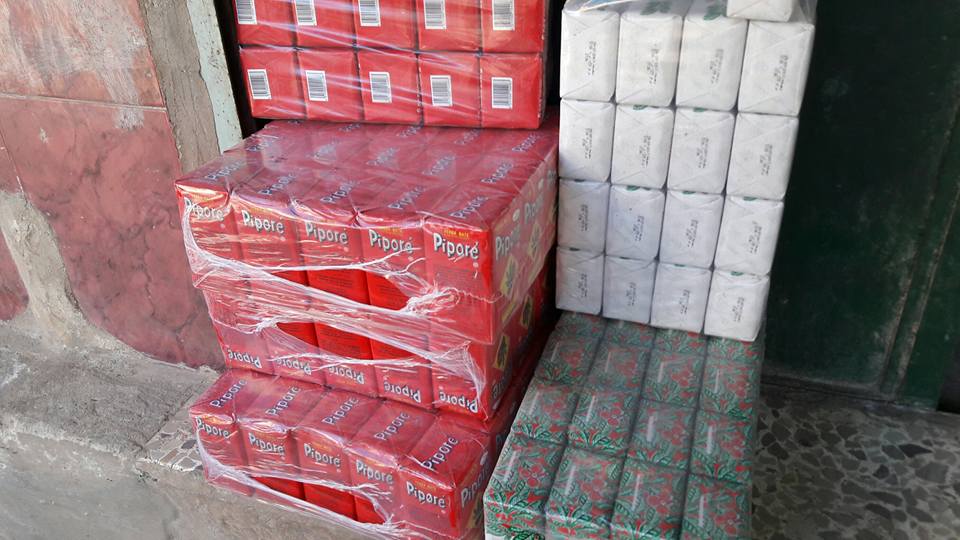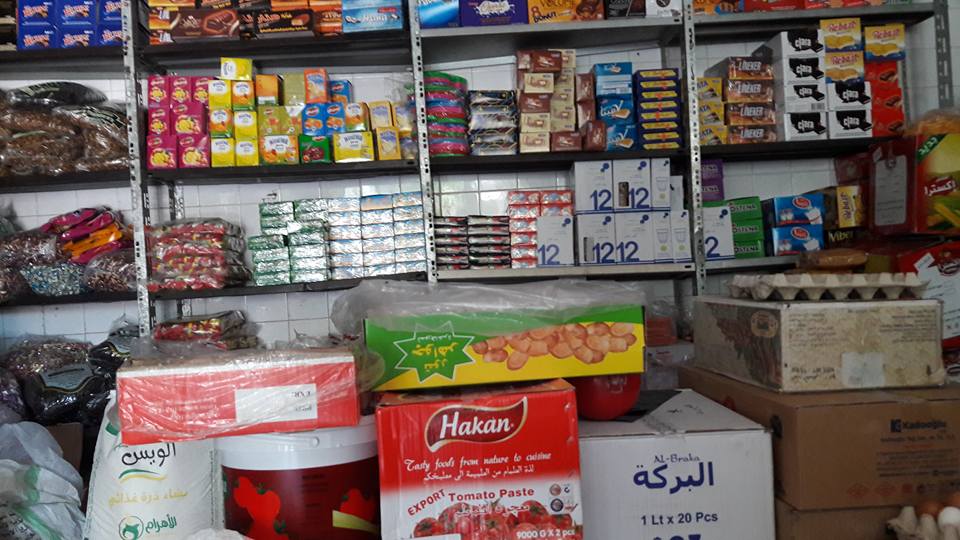(Eqtsad)- The northern Homs countryside has seen an unprecedented rise in the prices of food, commercial goods and fuel over the past week. The rise in prices preceded the agreement to reduce escalation that went into force three weeks ago.
Based on the agreement, two commercial crossings, under the administration of the opposition, regime and Russian forces, will be opened. Russia announced the agreement signed in Cairo on August 03, 2017. It is expected that none of the sides will impose a tax on the goods entering, and there will be no restrictions on the quantity of materials entering the northern Homs countryside.
Residents in the area are between a rock and a hard place, as the high prices have placed them into a precarious position between the regime and the northern ‘huamer’, a local term used to refer to major traders in the countryside. The traders, who number no more than 10, can buy the crossings and control prices.
For more than ten days, the crossings have doubled the fees to allow the entry of commercial materials, causing traders to oppose paying the required fees. The increase in fees resulted in the closure of the crossing before goods and fuel and the increase in the price of these goods.
Speaking to Eqtsad, Abu Samir a trader from the city of Rastan, said, “We were paying the crossing [administration] 25 million [Syrian] Pounds (S.P.) per week in exchange for allowing us to bring materials into the northern countryside. But 15 days ago, the crossing [administration] raised the price to 50 million Pounds per week without justification which led traders to refrain from paying the amount required to open the crossing.”
“It is certain that the crossing management has learned of the agreement that will cancel the weekly payments because of the Russian crossings opening. This led them to increase the price and reap the last possible profits from the existing crossings, but they did not expect the rural traders not to accept and the crossing closed without a result,” he added.
Clashes between the Regime Thugs at the Crossings
Local residents mentioned to Eqtsad that the regime forces at the Dar al-Kabira crossing prevented foodstuffs, vegetables, fruit and flour from entering Homs northern countryside 20 days previously. The move resulted in the increase of the prices of all these products by 25-50%.
The regime forces at the crossing, the Ahmad Sigati and Fadi Qaribish militias subordinate to the Hama Intelligence Branch, are located in the villages of Bareen and Khirbat al-Jamaa. Local sources explained that clashes with light weapons broke out between members of the two militia groups in the village of Bareen close to Houla. The clashes ended with an agreement to double the tax on the food products entering northern Homs countryside. The militias quadrupled the fees on each car carrying food products entering al-Houla by Khirbet al-Jamaa crossing point.
In an interview with Eqtsad, Abu Ahmed, a wholesale trader said, “The regime and its militias are trying through this matter to achieve what they failed [to achieve] by force of weapons on the northern Homs countryside.” He continued that the tax on every car entering rose from 250,000 S.P. to 1 million and 100,000 S.P. The tax doubled more than four times in one month for the tax to reach 100% of the price of some goods.
Abu Ahmed confirmed that traders are bringing in necessary foodstuffs and are waiting to be allowed to bring in food and medical supplies from the regular crossings included in the terms of the new agreement to reduce escalation in northern Homs.
Speaking about the agreement, Abu Hassan, a trader, said, “The regime’s step is the first of its kind in Homs province, although similar ones exist in the rest of the liberated areas.” He added that he expected that the goal is to collect more funds before the opening of the truce crossings of northern Homs.

The arbitrary policy of opening and closing the crossings forced traders in the northern Homs countryside to store huge amounts of food products, commercial goods and fuel until the siege starts, and then they sell the products for exorbitant prices. With the agreement signed, the specter of siege and displacement from the northern Homs countryside has been put at bay. The tide has turned towards pacification and economic stability, which traders’ strategic inventory practices a self-inflicted burden, so they decided not to pay the crossing tax fee and market their stocks at high profits.
“We have been accustomed during the past five years to the greed of traders who have made this move to prevent the entry of foodstuffs and fuel to double the prices and profit from the materials in their stores, they are currently besieged and making their last strike,” said Abu Mohammed from Gharanta.
The crossing administration did not count on the traders Homs’ countryside refusing their demands. Previously the traders bought the crossing in an exchange resembling an auction where the highest bidder among the traders managed the crossing and profited from the remaining traders.
But the reduction of escalation agreement and what will accompany it from free trade corridors prompted traders for the first time to refuse to open the crossing in light of their desire to dispose of their stocks at the highest prices possible. Many of the inhabitants of rural Homs are complaining about this issue. Traders, in contrast, defend their actions by saying, “If the rural traders concede to the crossing administration, prices would have gone up more.”
“The population accuse us of not paying the crossing administration to empty our warehouses of goods, but what they do not know is that the prices would have risen more than they are now if we had conceded to the crossing management,” said Abu Wael, a trader from the al-Zafarana village.
As soon as the news of the crossings’ closure spread, prices soared insanely even before small shops in the area were emptied of their contents. The closure and subsequent run on the shops is familiar to many of the inhabitants of northern Homs countryside.

Qassim Abu Salim, a resident ofal- Ghantu, said, “As soon as we heard about the closure of the crossing the price of goods doubled in less than a minute and an arbitrary manner. Some shops raise [prices] a little, and other shops exaggerate the rise in prices, and others monopolize and close the shop. It is a greed we have become accustomed to in the five years of siege, and there is no civilian or military authority over them [the traders].”
The 147,000 residents of northern Homs countryside have become used to this reality after five years, but the recently signed agreement indicates the living conditions will improve if the Russians ratify the agreement.
During Eqtsad’s reporters’ visit to some of the commercial markets in the northern countryside of Homs, he noted the total absence of summer fruits and a large scarcity of food. Our reporter also recorded the following prices of the following goods:
1 bag of sugar (50 Kilograms) rose from 16,500 S.P. to 21,200 S.P.
1 liter of sunflower oil rose from 600 S.P. to 800 S.P.
1 packet of baby diapers rose from 32,000 S.P. to 38,000 S.P.
1 carton of red mate rose from 41,000 S.P. to 46,500 S.P.
1 bag of cement (50 Kilogram) rose of 3000 S.P. to 5000 S.P.
1 gas container 6200 to 9000 S.P.
The price of fuel increased by 30%.
It is expected that a kilogram of bread will increase to reach 500 S.P. after the reserve store runs out in the event the exorbitant taxes continue to be imposed on the products entering Homs’ northern countryside.
















Comments About This Article
Please fill the fields below.